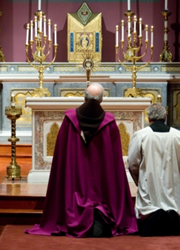From the cardinal’s blog
On Friday March 9 I led a Eucharistic Holy Hour in the chapel of the cathedral on the first day of a Novena to St. Patrick for vocations.
The Holy Father, Pope John Paul II blessed six monstrances, one for each of the inhabited continents, for prayer for vocations. The monstrance for North America is in the diocese now as we make this novena for vocations anticipating our patronal feast -- the feast of St. Patrick.
In Ireland, St. Patrick’s Day has always been a very religious holiday. I remember as a child I was always amazed that the president of Ireland and the Taoiseach, the prime minister, and so many lord mayors of Dublin and other cities would be in the United States for St. Patrick’s Day. I always wondered to myself, “Why, weren’t they home having their own parades?”
It was only later on that I came to realize that our celebrations here have always been of a more civic, social nature -- with parades and parties and the like -- whereas in Ireland it was a day where everyone went to Mass. It was a holy day, really.
As so often happens, the secular culture can co-op our religious traditions and figures. For example, St. Valentine has been completely lost to the greeting card, florist and chocolate industries. They have completely usurped any memory of the martyr-saint who was St. Valentine. Also take the case of St. Nicholas who is a very important saint in the history of the Church. He participated in the Nicene Council. He is one of the fathers of the council who wrote the creed that we pray at Mass every Sunday. Yet he has been transformed into a fat man in a red suit who wriggles down people’s chimneys to give them Christmas gifts that they don’t need.
St. Patrick has, in some ways, been eclipsed by the green beer and the parties and the silly hats. For this reason, I am enthusiastic about the fact that we are working to make it more of a religious holiday here. St. Patrick is our patron saint. He was a great bishop, a great missionary and a great evangelizer. He faced incredible opposition and difficulties in his ministry but he was on fire with the love for Christ and his desire to share that love and faith with the Irish people, in fact the very people that had enslaved him. He wanted to bring them the Christian faith. So all of us who are of Irish descent have a great debt of gratitude to this apostle who evangelized our ancestors.
Indeed, St. Patrick had a special knack for turning people into evangelizers and making the country that he converted to Catholicism the center of missionary activity. So many of the countries of Europe were evangelized in the Middle Ages by Irish missionaries, and in modern times our foreign missions, in great part, have been staffed by priests, sisters and lay people from Ireland. The Legion of Mary, in particular in missionary countries, was one of the most effective instruments of evangelization. And all of these things are rooted in the faith and the ministry of St. Patrick.
So I am very pleased that here in Boston which is in some ways a very Irish place, (though we rejoice in the great diversity we have, and if you read this blog regularly you see just how diverse we have become) we are able to look at the Gospel message of the life of this saint and to use it as a time to pray for vocations. We pray that all Catholics will have a sense of their vocation, and discipleship and to be transformed by the love of Christ in the grace of their baptism and feel the holy compulsion to share with others the faith and the joy they find in knowing Christ and following Him.
Also in this post:
> The immigration raid in New Bedford
> St. Patrick’s celebration at St. Peter Parish in Cambridge
> Retreat for women considering a vocation to the religious life
> Attending Board of trustess meeting at the Catholic University of America
> Speaking at St Mary-St. Catherine of Siena Parish in Charlestown
> Attending a meeting of the St John’s Seminary Board of Trustees



















